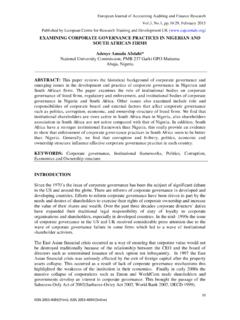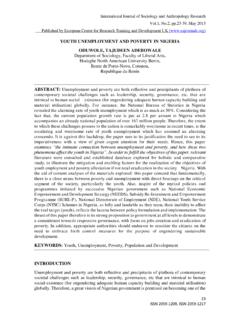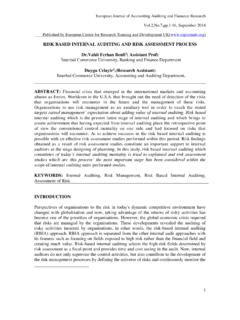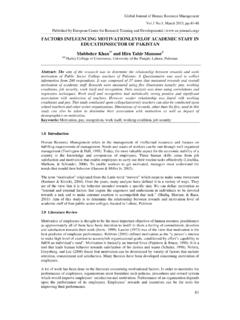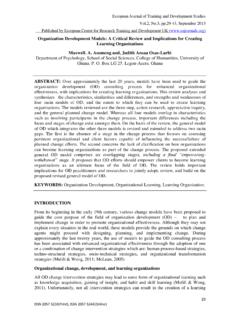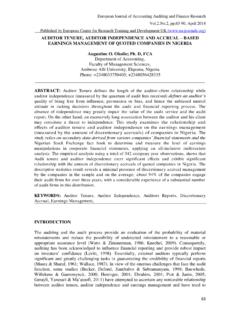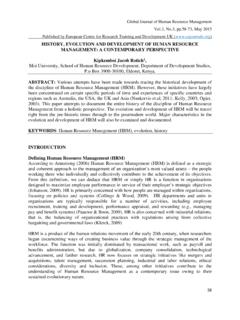Transcription of Business Ethics and Corporate Social Responsibility for ...
1 European Journal of Business and Innovation Research , , , December 2016 ___Published by European Centre for Research Training and Development UK ( ) 26 ISSN 2053-4019(Print), ISSN 2053-4027(Online) Business Ethics AND Corporate Social Responsibility FOR Business SUCCESS AND GROWTH Godfrey Adda, Dr. John Bosco Azigwe, Aboteyure Roger Awuni School of Business , Bolgatanga Polytechnic, P. O. Box 767, , Ghana ABSTRACT: The concepts of ethical behavior and Corporate Social Responsibility have come to the fore in recent years in both developed and developing countries as a result of growing sense of Corporate wrongdoing. These two concepts can bring significant benefits to a Business . The idea that Business enterprises have some responsibilities to society beyond that of making profits for shareholders has been around for centuries. The paper addresses the concepts of Business Ethics and Corporate Social Responsibility .
2 From the perspectives of MBA students and managers, it came out that Business Ethics and Social Responsibility are very important for organizational growth and success. Specifically, they consider Business Ethics to lead to positive employee, customer and community relations. Not only that but also, they perceive that better public image/reputation; greater customer loyalty; strong and healthier community relations can inure to the benefit of corporations that are socially responsible. Implications of the findings are finally drawn. KEYWORDS: Business Ethics , Corporate Social Responsibility , and Business Growth. INTRODUCTION Ethical behavior and Corporate Social Responsibility can bring significant benefits to a Business . The idea that Business enterprises have some responsibilities to society beyond that of making profits for shareholders has been around for centuries (Barry, 2000).
3 This partly accounts for the reason why the concept of Corporate Social Responsibility (CSR) has continued to grow in importance and significance (Carroll & Shabana, 2010). One of the core beliefs is that Business organizations have a Social and ethical Responsibility , as well as, the economic mission of creating value for shareholders or owners of businesses (Carroll, 1989). Whereas, the economic responsibilities of a Business are to produce goods and services that society needs and wants at a price that can perpetuate the continuing existence of the Business , and also satisfy its obligations to investors; ethical responsibilities are those behaviors or activities expected of businesses by society and other stakeholders such as employees (Ferrell & Fraedrich, 1997). This paper seeks to answer the following: What are the perceptions of students in Business Schools on the benefits of CSR and Ethics to corporations?
4 What do the Business community and organizations get out of CSR and ethical behavior? That is, how do they benefit tangibly from engaging in CSR policies, activities and ethical practices? The paper also seeks to articulate what Social Responsibility and Ethics means, and why it makes good Business sense to integrate the two concepts into strategic decisions, policies and practices of businesses. Specifically, we gauge the perceptions of MBA students and managers on the following: European Journal of Business and Innovation Research , , , December 2016 ___Published by European Centre for Research Training and Development UK ( ) 27 ISSN 2053-4019(Print), ISSN 2053-4027(Online) 1) Business ethical behavior and how Ethics can be integrated into corporations for mutual benefits. 2) Some of the forces relating to CSR and how CSR can be integrated into sustainable Business strategies.
5 In next to follow, we review the literature on CSR and Business Ethics to put the study in perspective. We first explore the concepts of Business Ethics and CSR; and the relevant stakeholder groups (internal and external of the firm) involved. This is followed by the methodology through which data was collected to illuminate the research. Then we present our findings, discussions and conclusions. LITERATURE REVIEW Unethical behavior or inability to demonstrate Corporate Social Responsibility can damage a firm's reputation and make it less appealing to relevant stakeholders (Daft, 2001). The concepts of Business Ethics and Social Responsibility are often used interchangeably, although each has a distinct meaning (Carroll, 1989; Daft, 2001; Shaw & Barry, 1995). Whereas Business Ethics includes the moral principles and standards that guide behavior in the world of Business ; Corporate Social Responsibility (CSR) is an integrative management concept, which establishes responsible behavior within a company, its objectives, values and competencies, and the interests of stakeholders (Meffert & M nstermann, 2005).
6 Companies that consistently demonstrate ethical behavior and Social Responsibility generate better results (Carroll, 1989). Business Ethics Ethics are codes of values and principles that govern the action of a person, or a group of people regarding what is right versus what is wrong (Levine, 2011; Sexty, 2011). Therefore, Ethics set standards as to what is good or bad in organizational conduct and decision making (Sexty, 2011). It deals with internal values that are a part of Corporate culture and shapes decisions concerning Social Responsibility with respect to the external environment. The terms Ethics and values are not interchangeable (Mitchell, 2001). Whereas Ethics is concerned with how a moral person should behave; values are the inner judgments that determine how a person actually behaves. Values concern Ethics when they pertain to beliefs about what is right and wrong.
7 In the Business setting, being ethical means applying principles of honesty and fairness to relationships with coworkers and customers (Daft, 2001). Business or Corporate Ethics is a form of applied Ethics or professional Ethics that examines ethical principles, and moral or ethical problems that arise in a Business environment (Stanwick & Stanwick, 2009). It is an umbrella term that covers all Ethics -related issues that come up in the context of doing Business . Business Ethics is defined as the rules, standards, codes, or principles that provide guidance for morally appropriate behavior in managerial decisions relating to the operations of the corporation, and Business relationship with the society (Sexty, 2011). It applies to all aspects of Business conduct and is relevant to the conduct of individuals and the entire organization (Mitchell, 2001).
8 Furthermore, Business Ethics is the behavior that a Business adheres to in its daily dealings with European Journal of Business and Innovation Research , , , December 2016 ___Published by European Centre for Research Training and Development UK ( ) 28 ISSN 2053-4019(Print), ISSN 2053-4027(Online) its stakeholders ( , employees, customers, suppliers, immediate community and society in general) (Dombin, 2012). The growth of Business organization relies on its sound ethical code of conduct set to guide both management and employees in its daily activities (Steve, Steensma, Harrison & Cochran, 2005). The logic supporting Ethics as a good practice, is that, ethical contexts will create the proper climate which will aid to drive the development of ethical human resource practices (Buckley et al., 2001). The result is a shared value system that channels, shapes, and directs behavior at work.
9 The advantages of ethical behavior in Business include the following (Mitchell, 2001): 1) Build customer loyalty: A loyal customer base is one of the keys to long-range Business success. If consumers or customers believe they have been treated unfairly, such as being overcharged, they will not be repeat customers. Also, a company s reputation for ethical behavior can help it create a more positive image in the marketplace, which can bring in new customers through word-of-mouth referrals. Conversely, a reputation for unethical dealings hurts the company s chances to obtain new customers. Dissatisfied customers can quickly disseminate information about their negative experiences with the company. 2) Retain good employees: Talented individuals at all levels of an organization want to be compensated fairly for work and dedication. Companies who are fair and open in their dealings with employees have a better chance of retaining the most talented people.
10 3) Positive work environment: Employees have a Responsibility to be ethical. They must be honest about their capabilities and experience. Ethical employees are perceived as team players rather than as individuals. They develop positive relationships with coworkers. Their supervisors trust them with confidential information. 4) Avoid legal problems: It can be tempting for a company s management to cut corners in pursuit of profit, such as not fully complying with environmental regulations or labour laws, ignoring worker safety hazards or using sub-standard materials in their products. The penalties if caught can be severe, including legal fees and fines or sanctions by governmental agencies. The resulting negative publicity can cause long-range damage to the company s reputation that can even be more costly than the legal fees or fines. Three levels of ethical standards There are three levels of ethical standards , the law, policies and procedures, and moral standards of employees (Josephson, 1988): 1) the law, which defines for society as a whole those actions that are permissible and those that are not.
